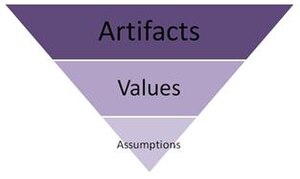

Edgar H. Schein
| |
|---|---|
| Born | (1928-03-05)March 5, 1928
Zürich, Switzerland
|
| Died | January 26, 2023(2023-01-26) (aged 94) |
| Nationality | American |
| Alma mater | Harvard University, Stanford University, University of Chicago |
| Known for | coercive persuasion, organizational development, career development, group process consultation, organizational culture |
| Scientific career | |
| Fields | Psychology |
| Institutions | MIT Sloan School of Management |
Edgar Henry Schein (March 5, 1928 – January 26, 2023)[1] was a Swiss-born American business theorist and psychologist who was professor at the MIT Sloan School of Management. He was a foundational researcher in the discipline of organizational behavior,[2] and made notable contributions in the field of organizational development in many areas, including career development, group process consultation, and organizational culture.[3] He was the son of former University of Chicago professor Marcel Schein.

Schein's model of organizational culture originated in the 1980s. Schein (2004) identifies three distinct levels in organizational cultures:
The three levels refer to the degree to which the different cultural phenomena are visible to the observer.
The career anchor is a part of what one finds as they clarify their self-image surrounding one's (1) needs and motives, (2) talents, and (3) values, the anchor being set of needs, values, and talents that a person is least willing to give up when forced to make a choice. The concept is Schein's attempt to reflect the lifelong search of every human to find themselves.[6]
Schein's original research in the mid-1970s identified five possible career anchor groups: (1) autonomy/independence, (2) security/stability, (3) technical-functional competence, (4) general managerial competence, and (5) entrepreneurial creativity. Follow-up studies in the 1980s identified three additional constructs: (6) service or dedication to a cause, (7) pure challenge, and (8) life style.
A 2008 study distinguishes between entrepreneurship and creativity to form nine possible constructs.[7]
| International |
|
|---|---|
| National |
|
| Academics |
|
| Other |
|